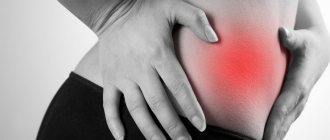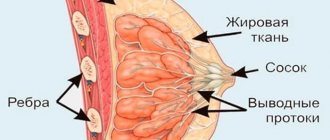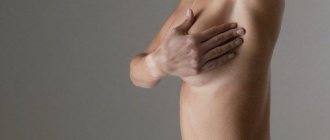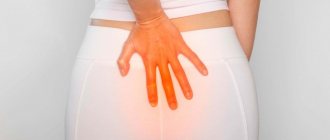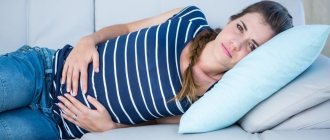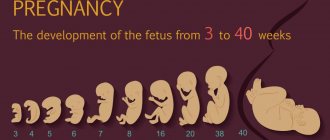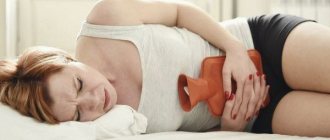Menstruation is the rejection of the functional layer of the endometrium lining the inner surface of the uterus, which has a certain cyclicity. Another name for menstruation is regula (from the word “regular”). The first day of menstruation is considered the beginning of the menstrual cycle - the period during which changes occur in the functioning of the reproductive organs, aimed at the possibility of conception. In a healthy woman, the cycle length is usually 28-30 days. These numbers are the classic norm, but for many women they can fluctuate depending on individual characteristics. Gynecologists consider the acceptable duration of the menstrual cycle to be from 25 to 34 days.
A few days before the start of the regimen, a woman’s health may worsen. Many people complain of increased weakness during this period, decreased performance, and constant drowsiness. Physiological sensations are also possible, for example, headaches, a slight increase in body temperature, and increased sweating. The most common complaint at the end of the menstrual cycle for most women is pain in the lower abdomen. Almost 60% of women of reproductive age experience this symptom. To understand whether this is normal or pathological, you need to know the possible causes of pain.
Lower abdomen hurts before menstruation
Serious associated symptoms requiring assistance
Sometimes abdominal pain after menstruation is accompanied by other symptoms that are very unpleasant. You need to pay attention to the following points:
- an increase in breast volume, the presence of discharge from the nipples in the form of a clear or white liquid;
- menstruation continues after the usual period;
- menstrual discharge has an unpleasant odor;
- pain in the abdomen is characterized by an increasing pace, at times it is impossible to touch the stomach, this causes even greater pain;
- body temperature is constantly elevated and remains at 37-37.5°C;
- There may be a sudden sudden rise in temperature to 38°C.
Such symptoms should alert you. You need to contact a gynecologist. He will do an examination and prescribe appropriate treatment based on it.
Problems with urination: natural causes
Frequent trips to the toilet that occur during menstruation are explained by normal changes in hormonal levels. This is how a decrease in the level of the hormone progesterone in a woman’s body manifests itself. Under its influence, body tissues strive to retain fluid. Before menstruation, the production of progesterone stops, and the water accumulated in the cells is excreted through the kidneys. This puts a strain on the genitourinary system. She is forced to work in double load mode.
In addition, a decrease in the level of sex hormones causes the uterus to contract. This is necessary to get rid of the separated endometrium. The myometrium contracts, which also irritates the bladder.
It is worth paying attention to the fact that before and during menstruation, women have a desire to eat more than usual. And as a rule, it is something sweet or meaty. You need to drink this kind of food often and a lot. And drinking too much leads to the need to urinate more often.
If during the period when your period is expected, you want to write more often than usual, you should take into account a possible pregnancy. This is one of the signs of its early recognition. The urge to urinate occurs due to relaxation of the sphincters against the background of increased production of progesterone. This may also be a consequence of changed eating habits, for example, eating more salt and spicy foods, which makes you want to drink more. Hence the frequent trips to the toilet.
Treatment methods
Pain in the lower abdomen, aching or pulling, can be relieved with medications. These are painkillers and anti-spasm medications, such as:
- spasmalgon;
- no-shpa;
- ketarol;
- spazgan;
- tempalgin.
These remedies are quite effective, quickly cope with problems and relieve pain.
When taking these drugs, you must remember that self-treatment may be incorrect. If the menstrual cycle has ended, and the lower abdomen still hurts after menstruation, then this phenomenon is abnormal and cannot be tolerated. Pain that lasts more than three days requires consultation with a specialist who will prescribe an examination and then treatment.
Main causes of pain
The question is not so simple, and even experts will not answer it unambiguously right away. After all, the reasons why the lower abdomen hurts before menstruation can be completely natural, that is, as doctors say, physiological, or in fact indicate a certain pathology. In order to identify any violations, additional diagnostics should be carried out.
The physiological reason for such pain lies in the peculiarities of the monthly female cycle. Mainly, such unpleasant sensations are caused by the hormone endorphin, or rather, its lack. The production of endorphin, which is also often called a “natural opiate” because it dulls pain, causes a feeling of calm or even satisfaction, is stimulated by the appearance of progesterones and estrogens in a woman’s blood.
However, shortly before the onset of bleeding, that is, menstruation, their levels drop sharply. At the same time, the level of endorphins also decreases, which is a strong hormonal imbalance, leading to a feeling of dissatisfaction, frustration, and irritability. For the same reason, pain appears in the lower abdomen, which is caused by strong contractions of the uterus, which gets rid of excess epithelium.
For the same reason, the so-called premenstrual syndrome is formed. It is provoked by hormonal changes, as well as subsequent changes in the composition of potassium and calcium. PMS is accompanied by severe and frequent imbalances in mood, loss of concentration, severe fatigue, headaches, and sometimes nausea.
There is a widespread stereotype among women that severe premenstrual periods are normal. Some girls are even convinced that menstruation must be accompanied by mood swings and severe pain. In fact, if PMS symptoms are too severe or prolonged, this is already a reason to discuss the problem with your doctor, since in the future this condition worsens the quality of life of any woman.
go to top
ethnoscience
If, upon examination, the gynecologist does not find any problems with women’s health, but the lower abdomen and lower back hurt after menstruation, you can use folk remedies. They are inexpensive and simple, and the effect will be good. Among them are the following:
- If you feel pain in the lower abdomen after your period, you can wrap this area in a warm scarf and put woolen socks on your feet. It is recommended to get plenty of rest; sports and heavy lifting are prohibited.
- You can make herbal tea. To do this, mix the following components in equal parts: chamomile, thyme, St. John's wort, lemon balm leaves. Pour boiling water, leave, strain, add lemon and honey. Drink the prepared infusion instead of tea.
- The following infusion will help relieve abdominal pain after menstruation: 1 tsp. Pour boiling water (200 ml) over wormwood, leave, strain. Take half a glass twice a day for up to 5 days.
- Some women have pain in the uterus after menstruation purely psychologically. In this case, changing your daily routine and walking in the fresh air will help.
These traditional methods of treating the disease can give a positive result, but before such treatment it is still necessary to consult a doctor and make sure that there is nothing serious.
Diagnosis in case of severe pain
If the pain becomes too severe, is accompanied by other symptoms, and the woman suspects that this may be the result of any disease, she should consult a doctor. During the examination, the gynecologist will find out when the pain occurs, what its nature is, where it is localized, what other ailments bother the patient before the onset of menstruation, and also how many days before the start of the cycle the pain begins to appear.
Next, an examination is carried out on a gynecological chair, palpation of the vaginal tissue, and examination using special mirrors. To clarify the cause of pain and diagnose a possible disease, you need to take urine and blood tests. The doctor will issue a referral for an ultrasound scan. If the cause is inflammation in the urinary tract, you need to undergo additional tests to diagnose the type of infection.
Additional studies may be needed, such as laparoscopy or hysteroscopy - this is the study of scrapings of the mucous membrane of internal organs. Once an accurate diagnosis is made, the doctor will prescribe complex therapy.
Using special exercises
A set of special exercises will help you get rid of periodic pain in the lower abdomen after menstruation. They are based on the elements of yoga and have an effective effect on this pathology.
You can learn the following poses on your own:
- Cobra pose is good for relieving abdominal pain. To perform it, you need to lie on the floor face down, arms bent at the elbows. Slowly raise your head and chest, then connect your arms and lift your torso, arching your back until a tingling sensation appears in the spine. In this case, the head must be tilted back as much as possible. The exercise is accompanied by proper breathing. Inhale when raising the body, exhale when lowering. Perform up to 3 times.
- Bow pose. Lie on your stomach, spread your legs slightly to the sides, bend them at the knees, lift them and clasp your ankles with your hands. Take a deep breath. Slowly straighten your legs, making a maximum bend. Hold for as long as you can breathe. As you exhale, return to the starting position.
A yoga instructor will help you choose a few more exercises that will also help get rid of abdominal discomfort after your period.
Abdominal pain can have different etiologies. The main thing is to find the reasons that cause them and take the correct treatment to prevent complications of the disease.
Pain before the onset of menstruation is common for many women. The uterine mucosa (endometrium) is renewed, which is why discomfort occurs. But what if the lower abdomen feels tight after menstruation? There are a number of reasons why this could happen. Physiological reasons include: the onset of early ovulation, aldehysmenorrhea, vaginal dryness in the first days, and as a result, nagging pain after sexual intercourse, and, oddly enough, pregnancy. There are many more pathological causes. Nagging pain in the lower abdomen after menstruation can be a sign of andexitis, endometriosis, uterine fibroids, urinary and kidney diseases, disorders of the digestive tract, and neoplasms in the pelvic area.
The uterus and its structure
The uterus is a smooth muscle, hollow organ located in the pelvic area, its shape resembles a pear and is intended for bearing a fetus during pregnancy.
Uterus dimensions:
In a previously nulliparous woman, the uterus weighs 50 grams, and after childbirth, this figure increases to 100 grams. during the dormant period - its length does not exceed 7-8 cm, width - 5 cm.
- During gestation, the size of the uterus increases - its walls stretch up to 32 cm, and the hollow organ itself is capable of supporting the weight of the fetus up to 5 kg.
On each side, her body is supported by ligaments, providing anatomically sufficient movement during the period of gestation.
Its structure consists of the body and the neck, the isthmus - in many women it is tilted forward. The part of the organ located above the level of origin of the tubes is the fundus, on the right/left side at the very bottom there are its lateral edges, the upper ones are the corners of the uterus.
Structure of the walls of the uterus:
- The endometrium is the inner layer of the uterus. Its thickness varies from 1 to 3 mm. and it is penetrated by glands, produces secretions and is renewed during menstruation.
- The muscular, inner layer is the myometrium. It undergoes changes during gestation and its thickness does not exceed 3-10 mm.
- The outer layer is the serous membrane in the uterus and the peritoneum, which is attached to the posterior/anterior wall.
Ovulation
As you know, the menstrual cycle begins with bleeding. At the same time, simultaneously with its onset, a new dominant follicle is determined, which then begins to grow. Every day it increases by about 2 mm, and upon reaching 20-21 mm it bursts to release an egg ready for fertilization. This period is called ovulatory, and it usually occurs on days 12-16 of the cycle. But there are exceptions. So, if a woman’s cycle is short (26 days), or due to hormonal imbalance the follicle matures faster, then ovulation can occur as early as day 8. That is, menstruation barely has time to end before the ovulatory period begins. For many women, follicle rupture is painful and they clearly feel it. The stomach may ache like during menstruation, but within a day the pain goes away. During this period, changes in the amount and density of mucus can also be observed. There is more discharge, and its consistency resembles egg white.
Pregnancy
If menstrual flow is scanty and lasts only 1-2 days, then pain in the lower abdomen after menstruation may be a sign of pregnancy. In this case, implantation bleeding is mistaken for menstrual bleeding. During implantation (attachment) of a fertilized egg, blood is also released, but its amount is much less. The implantation process in some women causes pain, which is predominantly aching in nature. Less commonly, tingling in the lower abdomen, weakness, and increased body temperature may occur. After a few days, all symptoms disappear, and after 2-3 weeks, a pregnancy test shows a positive result.
Aldehysmenorrhea
Aldehysmenorrhea is painful menstruation, in which there is a disturbance in the general condition. Most often it occurs with an abnormal structure of the uterus, hormonal imbalance (increased levels of estrogen and decreased progesterone), organic lesions of the uterus after illnesses, abortions, complicated childbirth. Painful menstruation often torments women with a labile nervous system, prone to increased production and slow decay of prostaglandins - substances that cause uterine contractions. In this case, abdominal pain may appear even after your period has passed. Aggravating factors are intellectual overload, poor nutrition, and a sedentary lifestyle.
Problems with bowel movements: normal variant
To the question “Why do I often go to the toilet for a long time during my period?” The answer also lies in the peculiarities of the female body. During menstruation, the walls of the uterus relax. This process also affects the smooth muscles of the intestines. He, like the uterus, at this time works to evacuate everything unnecessary from the body. Therefore, a woman constantly wants to go to the toilet in a big way.
This is the simplest and most natural cause of specific discomfort during menstruation, and it explains why during menstruation you want to go to the toilet more often than usual. For the same reason, the process is often accompanied by mild diarrhea, which, of course, is unpleasant, but completely normal. “I constantly want to go to the toilet in a big way,” is a very common complaint among women at this time.
However, if diarrhea is accompanied by dizziness, nausea, abdominal cramps, and it is very painful to go to the toilet, the possibility of infection or poisoning should be considered. In this case, you need to consult a doctor as soon as possible.
Diseases related to gynecology
Pathological growth of the inner layer of the uterine wall, neoplasms and adhesions in the pelvis, inflammation of the appendages are other reasons why the lower abdomen feels tight after menstruation. It is worth noting that in case of gynecological problems, the stomach hurts on other days of the cycle. In addition, there are usually additional complaints, such as changes in the nature of discharge, increased body temperature, unstable cycles, and others. Let's consider common female diseases in which the stomach feels tight after menstruation:
- Andexitis is inflammation of the uterine appendages (ovaries, fallopian tubes). With this disease, the lower abdomen pulls on one side, left or right. Specific discharge may also be observed and body temperature may increase.
- Endometriosis is a disease in which the cells of the endometrial layer grow beyond their limits. The body of the uterus, appendages, and retrocervical space may be affected. Women with endometriosis experience a tightening in the lower abdomen after menstruation, and also spotting on other days of the cycle. If the disease is aggravated by the adhesive process, the pain may be severe, especially during sexual intercourse and defecation.
- Uterine fibroids are benign formations in the muscular layer of the uterus (myometrium). Characteristic symptoms are pulling or squeezing pain in the lower abdomen, painful sexual intercourse, frequent urination, constipation, and abdominal enlargement. Also, with uterine fibroids, menstruation may not end on time, lasting 8 days or more.
- An ovarian cyst is a benign formation that occurs due to the accumulation of secretions in the ovarian tissue. If your stomach feels tight after menstruation, you experience frequent urination, your weight increases, and your body temperature rises, this may indicate the formation of a cyst in the ovary. With this diagnosis, the pain is usually intense, suddenly passing, and is observed mainly after strong physical exertion, as well as during sexual intercourse.
To find out why your lower abdomen ache after your period, consult a specialist. Based on the results of ultrasound, general blood tests, urine, vaginal and cervical smears, the doctor will be able to make a diagnosis and give the correct recommendations for improving the condition.
Treatment of primary and secondary forms of dysmenorrhea
Since in the secondary form of the disease the cause of pain during menstruation is precisely the underlying disease, dysmenorrhea is eliminated by its complete cure. The doctor prescribes the patient the necessary treatment for this.
As for primary dysmenorrhea, adjusting your diet and lifestyle helps get rid of the unpleasant symptom. According to the results of studies and surveys, it manifests itself most clearly in girls and women whose work is associated with psychological stress and stress. And also for patients who, while working, are forced to remain in the same static position for a long time.
It was also found that women with pronounced symptoms of dysmenorrhea most often show signs of hypovitaminosis - a lack of necessary minerals and vitamins for the body. Therefore, pain prevention is often achieved by taking vitamin complexes as prescribed by a doctor. In particular, this method is recommended for girls who are not sexually active and with mild symptoms of dysmenorrhea.
For women, as a preventative measure, gynecologists often prescribe COCs - combined oral contraceptives. These medications can reduce the amount of bleeding during menstruation due to suppression of ovulation and endometrial growth. In some cases, COCs are combined with analgesics.
Also, for primary dysmenorrhea, the following may be prescribed:
- Sedative medications of varying intensity - from herbal supplements to tranquilizers.
- Antioxidants that can normalize the production of prostaglandins. In particular, vitamin E.
- Magnesium citrate, magnesium absorbate and other magnesium preparations, which simultaneously reduce the symptoms of dehydration and alleviate the feeling of anxiety.
- In some cases, patients are offered phytoestrogens as an alternative to hormone replacement therapy. However, the opinions of medical specialists on these funds are contradictory.
In addition, observations of girls and women who have adopted an active lifestyle, jogging, and going to the gym, have shown that periodic exercise can reduce pain during menstruation.
Urinary and kidney diseases
The presence of stones, inflammation of the bladder and kidney tubules also cause pain in the lower abdomen. During menstruation, a woman’s immune defense decreases, so she can easily get pyelonephritis or cystitis (people say “got a cold”). The acute period of such diseases is characterized by: fever, cutting, shooting, aching pains, which tend to spread to neighboring organs and the lower back. Painful urination is almost always observed. After about a week, the alarming symptoms may go away on their own. However, without treatment, inflammatory processes often become chronic.
High intensity pain 3-5 days before menstruation
If the pain syndrome is of high intensity and the woman cannot perform usual actions, it is necessary to consult with the supervising gynecologist. Such a symptom may indicate hidden inflammatory processes and other pathologies of the genitourinary system and reproductive organs, which worsen before the onset of regulation due to decreased immunity caused by natural physiological changes in the body.
Uterine fibroids
Uterine fibroids
Myoma ranks second in prevalence among female benign tumors, second only to fibroadenoma of the mammary glands. The formation is benign in nature and consists of myometrial muscle tissue - a layer consisting of intertwined myocytes that constantly contract in a random order and rhythm.
Gastrointestinal disorders
Pain in the lower abdomen can be caused by intestinal dysfunction. The lower section (rectum) in women borders the uterus and the back wall of the vagina, so even ordinary constipation often causes discomfort and pressure. Considering that during menstruation, women’s gastronomic preferences leave much to be desired, bowel irregularities at the end of menstruation are natural. Therefore, if your menstrual days are over and your lower abdomen continues to hurt, you should reconsider your eating habits. Less commonly, nagging pain in the lower abdomen is caused by infectious diseases, benign formations, intestinal obstruction, flatulence, and appendicitis.
When you can’t do without the help of a specialist
Abdominal pain after menstruation is not always dangerous. For example, if they are caused by early ovulation or constipation due to diet disorders. However, the main problem is that it is impossible to independently determine the cause of this phenomenon. There is only one option left - go for a consultation with a specialist. It is especially important to do this if you have the following complaints:
- after menstruation, the lower abdomen hurts, the pain is cramping in nature, radiates to the lower back, hips, and groin area;
- there is severe swelling;
- after menstruation has ended, the woman experiences engorgement of the mammary glands, swelling of the legs and arms, and weight spontaneously increases;
- a woman suffers from insomnia, excessive irritability, causeless anxiety, depression;
- body temperature rises (37 and above);
- menstruation does not end at the usual time, blood is released in clots;
- severe dizziness and headache;
- there is severe nausea and vomiting;
- the discharge has a specific smell, color, consistency;
- the pain is so severe that the woman is forced to take painkillers.
If your stomach hurts after your period, a woman should be wary. This symptom is characteristic of many diseases. It is better to be examined once and accurately determine the cause of the ailment than to endure and thereby miss the initial stage of the disease.
Possible causes: abortion, ovulation, diseases of the uterus and appendages, tumors on the ovaries, fibroids, infections in the genital tract. A reason to urgently consult a doctor.
Mild discomfort during the menstrual period is considered normal. may appear before menstruation and last a few more days.
But it also happens that your period has passed and your lower abdomen feels tight. You cannot ignore the uncomfortable sensation, as it can signal that the body is not working properly. However, before taking painkillers, you need to figure out why your stomach continues to bother you after your period ends.
How to relieve the condition
Severe pain during menstruation significantly reduces the quality of life, causing increased anxiety and depression. It must be fought.
Medications can help reduce pain during menstruation. Traditionally, combinations of antispasmodics and non-steroidal anti-inflammatory painkillers are used: papaverine, drotaverine, ibuprofen, paracetamol. Combined products act faster and last longer. It is necessary to start taking them a day before the onset of painful sensations, otherwise the effect will be insignificant.
Drinks made from medicinal herbs and any diuretics also help relieve pain during menstruation:
- a decoction of shepherd's purse, dill seed or parsley;
- weakly brewed tea;
- berry compote.
Removing excess fluid from the body reduces the feeling of tension. It is not recommended to consume coffee or other stimulants.
If the tablets do not help reduce pain, it is recommended to remain calm, perform a light abdominal massage, and apply a warm heating pad. Sometimes it is not heat, but cold that helps reduce pain. It is necessary to use not ice, but a towel soaked in cool water.
Drinking painkillers is allowed for a limited time. If the usual doses of the drug do not have an effect, the drug is changed or injected analgesics are used.
After menstruation, stomach ache: possible causes
If your stomach hurts for some time after your period, the reasons for this phenomenon can be very different. Moreover, discomfort is not always associated with gynecological diseases.
The most harmless factor is bloating and constipation. Gastrointestinal problems can be transmitted to the uterus, and abdominal pain will vary. A consultation with a gastroenterologist or an effective drug for flatulence and other digestive disorders will help get rid of the symptom.
Abortion
After an abortion or spontaneous miscarriage, abdominal pain after menstruation will persist for several cycles.
You need to listen carefully to how you feel, because inflammation can develop in the genital tract. It is dangerous to self-medicate; it is better to consult a specialist.
Ovulation
If the spotting stopped 7-10 days ago and a pulling sensation appears in the abdomen again, the symptom may indicate the beginning of ovulation. The process of releasing a mature egg occurs after menstruation and the woman feels that she is pulling in the lower abdomen and.
Discomfort is associated with rupture of the follicle. Sometimes during ovulation a small amount of blood comes out of the genital tract. For many women, the ovulatory phase is asymptomatic. But if the time of ovulation approaches and your stomach begins to ache, this is normal.
Inflammatory diseases of the uterus and appendages
As a rule, gynecological diseases are accompanied by severe symptoms. For example, with adnexitis, the appendages become inflamed and adhesions form in the tubes. Patients complain of the following symptoms:
- Bad feeling.
- Temperature increase.
- Unusual discharge from the genital tract.
- Pulls in the lower abdomen even if your period has long ended.
With vulvitis, the mucous membrane of the external genitalia becomes inflamed. Fungal and other infections may develop against the background of this disease. Symptoms of vulvitis are not limited to abdominal pain. These are accompanied by burning and itching in the intimate area, swelling of the labia and purulent discharge.
Endometriosis is a disease of the uterus in which the lining of the uterus grows to such an extent that it extends beyond the cavity and envelops other organs and tissues. The pathological process may be asymptomatic. Obvious signs of endometriosis are manifested by dark discharge with clots and pain during bowel movements and bladder, as well as during sexual intercourse.
In the early stages of pregnancy, a woman's period may be replaced by bleeding when the fertilized egg attaches to the uterus. Scanty discharge and nagging abdominal pain after bleeding are signs of pregnancy. If the child is desired, you need to contact a gynecologist, undergo an examination and register.
Tumors on the ovaries
If you periodically feel tightness in your lower abdomen after your period, it is possible that a tumor is developing on the ovary. A kind of liquid bubble can reach large sizes. The cause of the nagging pain lies in the pressure that the bubble exerts on neighboring organs.
In addition, overstretching of the ovary is possible. If the tumor is benign, it may be functional. The cyst will resolve on its own in a few months.
A malignant tumor grows gradually. Discomfort in the abdomen is felt for several cycles.
Myoma and polyposis
A fibroid or polyp may form in the uterine cavity. A polyp can also form in the cervical canal.
If your stomach hurts acutely after the end of your period, and there was intense bleeding on your menstrual periods, most likely the discomfort is caused by a neoplasm.
Infections in the genital tract
It happens that your period has passed, but your stomach still hurts. Vaginal discharge has a yellowish tint and an unpleasant odor. The unusual nature of the discharge and pulling sensations are signs of an untreated sexually transmitted infection.
The symptoms are explained by inflammation and enlargement of the affected organ. Discomfort increases with intimate relations and active movement. Without treatment, the process becomes chronic, the clinical picture blurs. Getting rid of a chronic illness is difficult.
In young nulliparous girls, painful and pulling sensations in the lower abdomen after menstruation may be associated with the structural features of the internal genital organs. Typically, discomfort intensifies during menstrual periods and disappears by the middle of the cycle. After childbirth, physiological pain goes away on its own.
Pain in the uterus after menstruation
When, for some reason, the uterus hurts after menstruation, a woman thinks that her stomach just hurts. Pathology has different explanations:
- Incorrect location of the reproductive organ.
- High estrogen levels.
- Hormonal disorders.
- There is a contraceptive device in the uterine cavity.
It has been noticed that pain appears due to insomnia, stress, anxiety, and psycho-emotional tension. For timely diagnosis of pathology, you should consult a doctor as soon as possible with complaints and differentiate it from diseases not related to menstrual function.
Why does your stomach ache if you don’t take into account your periods?
- Gastritis.
- Stones in the kidneys.
- Worm infestation.
- Appendicitis.
- Stomach ulcer.
- Inflammatory processes in the kidneys and gall bladder.
- Diseases of the duodenum.
You should also take into account the fact that after childbirth, women experience lochia - bloody discharge. They are not menstrual periods. This is a cleansing of the uterus of a different nature. In some cases, lochia is accompanied by pain. As lactation ends, real periods begin. While the cycle is being restored, the woman feels abdominal pain.
What is this?
Algomenorrhea and dysmenorrhea are interchangeable concepts. Moreover, the first is more accurate. From Latin it is translated as “abnormal pain during the monthly cycle.” The second concept is narrower, but is used more often due to its ease of pronunciation and writing.
Why did my lower abdomen hurt during menstruation? The answer lies in the characteristics of the menstrual cycle. This is a regularly repeated process in the body of a girl or woman of childbearing age in preparation for conceiving a child. Its main components are two phases, estrogen and progesterone.
Initially, the maturation of follicles containing eggs occurs (respectively, in the ovary). One or two of them become dominant. Then preparations for their fertilization take place in the uterine cavity. If it does not happen, the cells die. And then comes the rejection of the endometrium. This is the name given to the cells of the mucous membrane lining the uterus. The process can be divided into several additional phases.
Reason to urgently consult a doctor
Painful and nagging sensations after the end of menstruation take on a different character - it all depends on the individual characteristics of the body. To reliably assess the patient’s condition, the doctor takes an anamnesis and begins an examination.
A woman can describe pain in these words:
- Regular or periodic.
- Weak, strong, moderate.
- Sharp, dull.
- Pulling, stitching, aching, spastic.
- Occurring for no reason or under the influence of trauma, anxiety, overwork, intimacy.
Be that as it may, pain itself is not the norm for a healthy body and requires medical intervention. A woman should immediately contact a gynecologist if she not only feels pain in her lower abdomen after menstruation, but also has the following warning symptoms:
- Stable hyperthermia.
- After menstruation, the breasts swell.
- White or clear discharge comes out of the nipples.
- Foul-smelling, opaque discharge from the genital tract.
- Discomfort increases in the postpartum period.
If the doctor has not discovered a serious pathology, the development of which provokes discomfort, a woman can use folk remedies to ease her well-being. Herbal infusions of lemon balm, thyme, St. John's wort, and chamomile will help overcome pain. Honey and lemon are added to tea. You can prepare a healing drink from dry wild strawberry leaves.
After drinking, you can wrap your stomach area with a warm scarf and put thick socks on your feet. Lifting weights on days when your stomach hurts is not recommended. You can also brew wormwood herb with boiling water (1 tsp per 200 ml). Healers recommend drinking the bitter infusion 2 times a day, 100 ml.
If you don’t have time to prepare decoctions and infusions, you can relieve pain with No-shpa, Tempalgin, Spasmolgon and other drugs. If the nature of the pain is psychological, it is enough to reconsider the daily routine and allocate more hours for rest and walks. After all, sometimes it is not illness that worsens health, but a banal lack of fresh air and movement.
- this is a normal and correct physiological process in the life of every woman. Quite often during this period, a woman is accompanied by a discomfort in the abdominal area. After a few days from the first day of menstruation, the unpleasant sensations disappear and life returns to normal.
But what to do if your lower abdomen feels tight after your period? Why is this happening? There is no need to ignore this situation at all, because it can be caused by serious disorders in the female body. It is better to contact a gynecologist and know for sure that this is the individuality of the body, and not a symptom of a disease.
But it is possible that the pain is noticeable after menstrual periods.
Why does the abdomen ache after menstruation? There are many reasons.
Some of the harmless ones include:
- Genetic predisposition
. If in the female line there were unpleasant sensations after menstruation, there is a chance that this will be passed on to a young representative of the family. - Ovulation
. Many girls feel discomfort in the lower abdomen and lower back when the dominant follicle containing the egg bursts. And since the ovulatory phase can begin immediately after menstruation, a symptom appears: aching in the lower abdomen. - Pregnancy
. Another situation is when ovulation occurs before menstrual bleeding. The lady is left in the dark and unprotected sex occurs. Just after menstruation, the embryo attaches to the wall of the uterus and this causes spasm. Over time, other signs accompanying pregnancy will become apparent in the fair sex: hypersensitivity of the mammary glands and others. - Hormonal instability
. There are many reasons for failure. Perhaps taking hormonal medications disrupts the functioning of hormones or recent severe stress. - External factors
. This point implies isolated cases of discomfort in the lower abdomen after menstruation. This may be due to climate change, violations of the rules of proper nutrition, failures in the daily routine, excess strength loads, etc.
Pathological source of discomfort after menstruation
In addition to harmless causes that provoke pain in the lower abdomen, there are pathological sources of the problem. Most often, postmenstrual pain is more pronounced and more intense than normal menstrual pain.
Why is this happening? Most likely, for a reason in the female body.
So, the following diseases can cause stretching sensations in the lower abdomen after menstruation:
Genitourinary system
. Bladder inflammation can be caused by hypothermia, neglect of personal hygiene rules, using one pad or tampon for too long, etc.
The infection gradually develops in the body, causing heaviness in the abdomen and shooting sensations. In addition, these are accompanied by frequent urination to the toilet and the body temperature may increase. In such cases, it is recommended to consult a urologist. The doctor will identify the exact cause of the discomfort and remove it using treatment.
Among the diseases of the genitourinary system there are: cystitis, pyelonephritis and urolithiasis.
Gastrointestinal tract
can also give symptoms of abdominal pain. The reproductive system is located next to the gastrointestinal tract - so the lady confuses the problems. Again, only a doctor can determine the exact cause, so you should not wait for the disease to develop into something serious.
From the gastrointestinal tract there are such “surprises”: constipation, bloating, accumulation of gases in the intestines, intestinal obstruction, infection, surgical pathology and appendicitis.
Ectopic pregnancy.
The period has passed, but the lower abdomen is tight because the woman is pregnant. Unfortunately, this is a “wrong” pregnancy and you need to get rid of it urgently. It is this that can cause lingering pain in the lower abdomen.
Gynecological problems
. Quite often, the cause of heaviness in the lower abdomen is the female reproductive system.
Gynecological diseases include:
- . This is the growth of the endometrium beyond the uterine confines. The tissue grows in large quantities, engulfing neighboring organs, resulting in abdominal cramps. This problem is characterized by pain throughout the entire monthly cycle, which increases before the onset of menstrual bleeding. Among other things, a girl often feels pain during sexual intercourse. Endometriosis causes spotting between cycles. The pathological condition of the disease is considered to be lesions of the ovaries, which cause the occurrence of cysts. A cyst can cause infertility. The causes of endometriosis can be: heredity, disruptions at the hormonal level, after a cesarean section, cauterization of cervical erosion, a consequence of infection, as well as a nervous nature and disorders in the thyroid gland. Treatment is prescribed conservatively and surgically.
- Pain in the lower abdomen due to vulvitis
. This is an inflammatory disease affecting the mucous membrane of the external genitalia. Vulvitis can be caused by Candid fungus, infection, or failure to follow personal care rules. The striking symptoms of vulvitis are: severe itching, burning of the external genital organs, their swelling, serous-purulent discharge. - Adnexitis
can cause pain in the abdomen. This is inflammation of the female appendages (ovaries, fallopian tubes). When an inflammatory process in the fallopian tubes “works” in the body, this can provoke adhesions in the tubes, which, in turn, can lead to the accumulation of pus. All this causes a sharp deterioration in the woman’s condition, and her body temperature rises. If the disease is not treated, it will become chronic. A sign of adnexitis is spasmodic pain in the sides of the abdomen or in one of them. - Endometritis
. This is an inflammatory process in the inner mucous layer - the endometrium. At the initial stage of the disease, a woman’s body temperature rises, then serous-purulent discharge or bloody-purulent discharge appears. The lady feels severe discomfort in the lower abdomen, extending to the sacrum. Endometritis requires immediate treatment, because inflammation can grow far from the primary focus, and this is fraught with serious purulent-septic complications. The worst option is uterine amputation or sepsis with a fatal outcome.
Prevention of lower abdominal pain before menstruation
To avoid the question of how long your stomach hurts before your period , and to avoid discomfort, we recommend that you adhere to the following preventive measures:
- Avoid stressful situations. It is very important to be able to relax and tune in to a positive wave. The emotional turmoil that a woman unfortunately has to face throughout her life will have a negative impact on the health of her genitourinary system. Doctors recommend that women do yoga in the second half of their menstrual cycle.
- Get rid of bad habits. Quit smoking and reduce your consumption of alcoholic beverages. Scientists conducted a study in which they were able to find out that the female body does not cope with nicotine and alcohol in the same way as the male body. Therefore, these substances provoke the occurrence of many different diseases associated with the female genitourinary system.
- Follow a diet in the second half of the menstrual cycle. Limit your consumption of fatty, starchy and sweet foods. The main products that should be included in your diet are vegetables, fruits and dairy products. Drink as much pure mineral water as possible. Coffee and tea should also be excluded.
- Avoid hypothermia to avoid inflammatory processes in the pelvic organs and disturbances in the menstrual cycle.
- Follow the correct daily routine – get enough sleep, don’t go hungry. Otherwise, you will not be able to cope with stress and will have to take antidepressants and various sedatives.
- Take additional vitamin complexes and minerals so that they are enough to saturate all internal organs.
Signs that require immediate help
Often, during pain in the lower abdomen, a girl gets rid of it by taking a painkiller pill. But if the following symptoms are present, the pill will give a short-term effect.
For a while, it will seem that nothing hurts anymore and a visit to the doctor can be postponed or even canceled. But you shouldn't joke with your health.
And the problem will grow like a snowball:
- Nausea and vomiting;
- Severe pain in the lower abdomen;
- General weakness and malaise;
- Apathy, drowsiness;
- Edema;
- Nervous breakdowns;
- Vaginal discharge: purulent, bloody;
- Depressive states;
- Sleep disorders;
- Voracity;
- Constant thirst for water;
- Painful sensations during urination.
Among other things, you should immediately contact a specialist for help if a woman observes the following signs of pathology:
- Breast tenderness, enlargement and the appearance of vague fluid from the nipples;
- Prolonged menstrual bleeding, the duration and volume of which exceeds all established standards;
- The discharge has an unpleasant odor;
- Severe painful syndrome in the abdominal area, which makes it impossible to touch the stomach;
- A sharp jump in body temperature – 38.5% and above;
- Body temperature remains between 37 and 37.5% for a long time.
How to reduce pain during menstruation
To relieve discomfort during menstruation, girls are advised to:
- avoid stressful situations and intense physical activity;
- follow a balanced diet rich in calcium and magnesium (and also increase the amount of foods in the diet that promote the production of endorphins: chocolate, bananas);
- spend more time outdoors;
- perform special exercises to strengthen intimate muscles and abdominal muscles (of course, this needs to be taken care of in advance).
In some cases, PMS symptoms can only be alleviated with the help of properly selected oral contraceptives.

